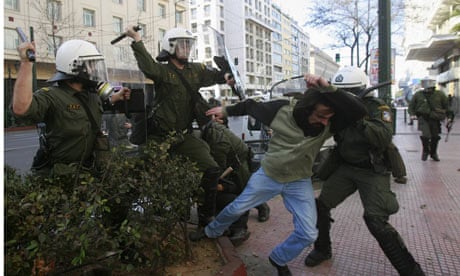Police fired teargas in clashes with demonstrators in central Athens today after more than 30,000 people took to the streets to protest against austerity measures aimed at reducing Greece public debt.
Riot police confronted violent protesters who hurled rocks, red paint and plastic bottles near the parliament building in sporadic clashes after a largely peaceful rally of disgruntled workers.
"A group of 50 youths tried to storm the university building and riot police fired teargas to stop them," a police official told Reuters.
At least two protesters were arrested. Earlier, thousands of public and private sector workers marched through the streets under the slogan "people and their needs above markets". The march was part of a general strike that prompted all flights to and from Greek airports to be cancelled and caused public transport to grind to a near-standstill, with most trains and ferries standing idle.
Schools, tax offices and council buildings remain closed, while public hospitals are using emergency staff.
The country's two largest trade unions oppose a wave of EU-backed spending cuts announced over the past weeks to reduce the budget deficit and help the country out of financial crisis.
It follows similar protests earlier this month, but this time private sector unions are also involved.
Television pictures showed a noisy crowd of tens of thousands of people marching through the streets of Athens, including many carrying union banners and anti-capitalist placards.
One of those protesting, civil servant Michalis Koroleos, told Reuters: "I am striking against the wage cuts, I am striking because others stole the money and we are the ones who are going to pay. They are cutting my allowances and I have two children to raise – it is difficult."
The protesters are angry at a public wage freeze, tax rises and the raising of the retirement age.
The strike coincides with a visit by officials from the European commission, the European Central Bank and the IMF to assess the success of such measures in cutting Greece's double-digit deficit. European finance ministers have warned that tougher austerity measures may have to be taken if progress is deemed insufficient.
Yesterday the credit agency Fitch downgraded the ratings of Greece's four largest banks a notch from BBB+ to BBB.
Earlier today the Greek government admitted manipulating its finances to mask its debt before it entered the Eurozone. "You simply put some amounts of money in the next year. It is what everybody did and Greece did it to a lesser extent than Italy, for example," Greece's deputy prime minister, Theodoros Pangalos, told the BBC's World Service.
He also suggested that Germany had an obligation to bail out Greece because of its occupation of the country during the second world war and because it stole Greek gold during the war.
"They took away the Greek gold that was at the Bank of Greece, they took away the Greek money and they never gave it back. This is an issue that has to be faced sometime in the future," he said.
